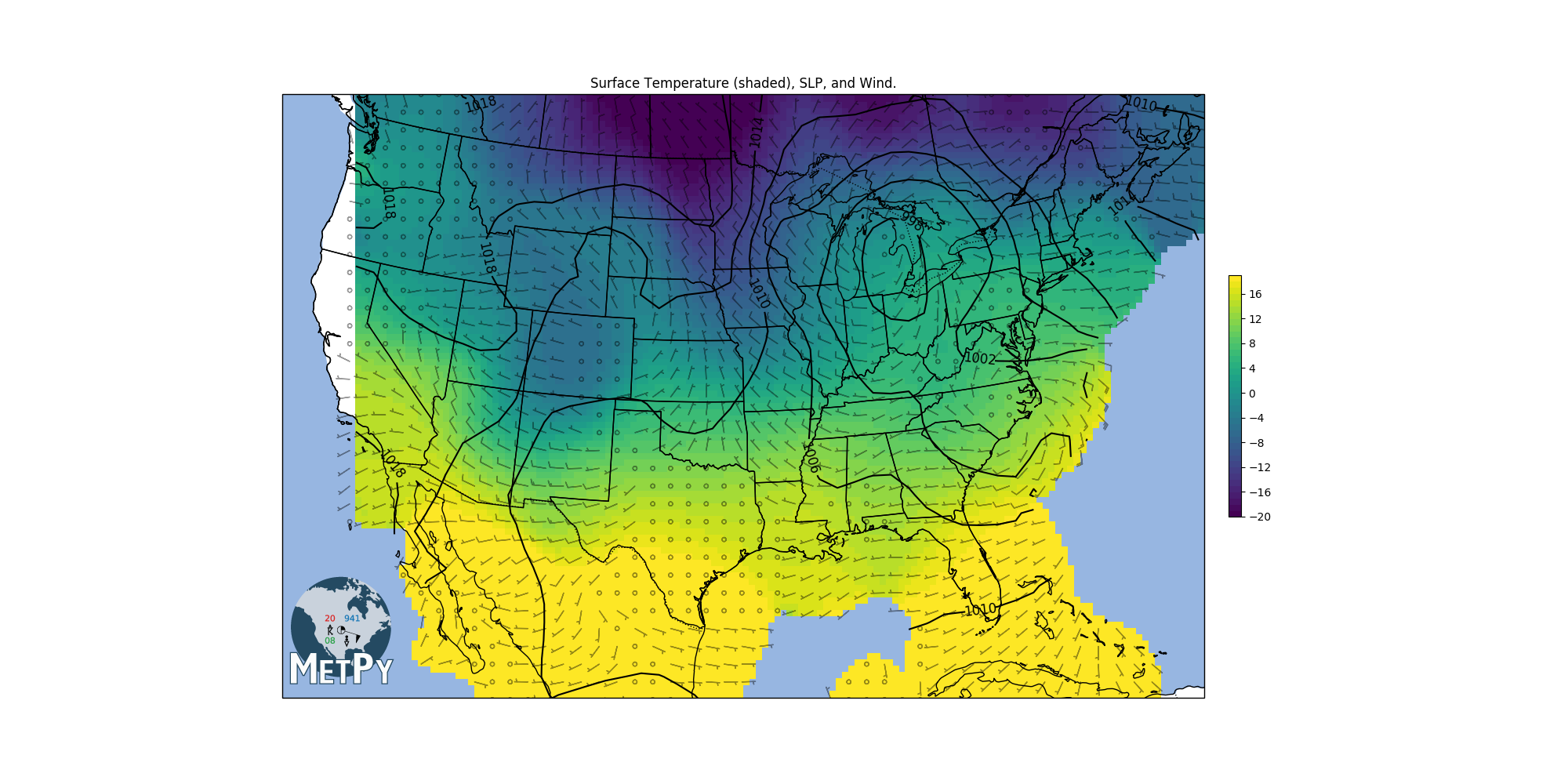Note
Click here to download the full example code
Wind and Sea Level Pressure Interpolation¶
Interpolate sea level pressure, as well as wind component data, to make a consistent looking analysis, featuring contours of pressure and wind barbs.
import cartopy.crs as ccrs
import cartopy.feature as cfeature
from matplotlib.colors import BoundaryNorm
import matplotlib.pyplot as plt
import numpy as np
import pandas as pd
from metpy.calc import wind_components
from metpy.cbook import get_test_data
from metpy.interpolate import interpolate_to_grid, remove_nan_observations
from metpy.plots import add_metpy_logo
from metpy.units import units
to_proj = ccrs.AlbersEqualArea(central_longitude=-97., central_latitude=38.)
Read in data
with get_test_data('station_data.txt') as f:
data = pd.read_csv(f, header=0, usecols=(2, 3, 4, 5, 18, 19),
names=['latitude', 'longitude', 'slp', 'temperature', 'wind_dir',
'wind_speed'],
na_values=-99999)
Project the lon/lat locations to our final projection
lon = data['longitude'].values
lat = data['latitude'].values
xp, yp, _ = to_proj.transform_points(ccrs.Geodetic(), lon, lat).T
Remove all missing data from pressure
x_masked, y_masked, pres = remove_nan_observations(xp, yp, data['slp'].values)
Interpolate pressure using Cressman interpolation
slpgridx, slpgridy, slp = interpolate_to_grid(x_masked, y_masked, pres, interp_type='cressman',
minimum_neighbors=1, search_radius=400000,
hres=100000)
Get wind information and mask where either speed or direction is unavailable
wind_speed = (data['wind_speed'].values * units('m/s')).to('knots')
wind_dir = data['wind_dir'].values * units.degree
good_indices = np.where((~np.isnan(wind_dir)) & (~np.isnan(wind_speed)))
x_masked = xp[good_indices]
y_masked = yp[good_indices]
wind_speed = wind_speed[good_indices]
wind_dir = wind_dir[good_indices]
Calculate u and v components of wind and then interpolate both.
Both will have the same underlying grid so throw away grid returned from v interpolation.
u, v = wind_components(wind_speed, wind_dir)
windgridx, windgridy, uwind = interpolate_to_grid(x_masked, y_masked, np.array(u),
interp_type='cressman', search_radius=400000,
hres=100000)
_, _, vwind = interpolate_to_grid(x_masked, y_masked, np.array(v), interp_type='cressman',
search_radius=400000, hres=100000)
Get temperature information
x_masked, y_masked, t = remove_nan_observations(xp, yp, data['temperature'].values)
tempx, tempy, temp = interpolate_to_grid(x_masked, y_masked, t, interp_type='cressman',
minimum_neighbors=3, search_radius=400000, hres=35000)
temp = np.ma.masked_where(np.isnan(temp), temp)
Set up the map and plot the interpolated grids appropriately.
levels = list(range(-20, 20, 1))
cmap = plt.get_cmap('viridis')
norm = BoundaryNorm(levels, ncolors=cmap.N, clip=True)
fig = plt.figure(figsize=(20, 10))
add_metpy_logo(fig, 360, 120, size='large')
view = fig.add_subplot(1, 1, 1, projection=to_proj)
view.set_extent([-120, -70, 20, 50])
view.add_feature(cfeature.STATES.with_scale('50m'))
view.add_feature(cfeature.OCEAN)
view.add_feature(cfeature.COASTLINE.with_scale('50m'))
view.add_feature(cfeature.BORDERS, linestyle=':')
cs = view.contour(slpgridx, slpgridy, slp, colors='k', levels=list(range(990, 1034, 4)))
view.clabel(cs, inline=1, fontsize=12, fmt='%i')
mmb = view.pcolormesh(tempx, tempy, temp, cmap=cmap, norm=norm)
fig.colorbar(mmb, shrink=.4, pad=0.02, boundaries=levels)
view.barbs(windgridx, windgridy, uwind, vwind, alpha=.4, length=5)
view.set_title('Surface Temperature (shaded), SLP, and Wind.')
plt.show()

Total running time of the script: ( 0 minutes 4.881 seconds)